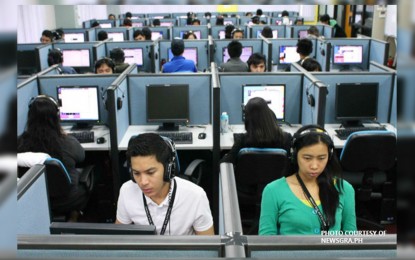
(File photo)
MANILA – Deputy Speaker Loren Legarda on Thursday urged the Fiscal Incentives Review Board (FIRB) to temporarily lift its ultimatum requiring business process outsourcing (BPO) workers to physically report to work by April 1.
In a statement, Legarda said the work from home (WFH) arrangement has proven to be effective to minimize health risks and prevent the spread of the coronavirus disease (Covid-19) without hurting the economy.
"Even with the WFH arrangement, the Philippine economy was able to survive in the last two years, and thanks to the growing number of micro, small, and medium enterprises (MSMEs) in the country, our economic activity is now more active than ever. We believe the WFH arrangement can sustain this momentum," she said.
Legarda said this remote setup would also help around 1.3 million BPO workers to cope with rising fuel prices and transportation costs, affording them the same mitigating opportunities given to other sectors affected by the current crises.
“Unfortunately, we now have other factors to consider aside from Covid-19: the unexpected oil price hike caused by the Russo-Ukrainian crisis which now affects the prices of our basic commodities, and the climate crisis which is expected to get even worse if we do not take drastic measures such as reducing our total carbon footprint,” Legarda said.
She said the changes that have been adopted in workplaces during the pandemic years have given workers the opportunity to "rethink the way they live, interact, and do their jobs".
"Many have remained committed to ensure that productivity and company operations are not compromised or sacrificed. Thus, we must undertake measures that would provide and prioritize the comfort and safety of our workers in general, and our BPO workers, in this case," she said.
The FIRB last week denied the request of the Philippine Economic Zone Authority (PEZA) and information technology and business process outsourcing (IT-BPO) industry to extend the WFH scheme for PEZA-registered IT-BPO companies.
In a statement early this week, PEZA Director General Charito Plaza said continuing the hybrid work model is efficient amid the increasing fuel prices and to decongest Metro Manila traffic.
“The recommendation is consistent with the telecommuting law (Republic Act 11165) —a legislation since 2018 that recognized working from an alternative workplace with the use of telecommunication and/or computer technologies— which preceded the Corporate Recovery and Tax Incentives for Enterprises (CREATE) Act,” Plaza said.
Meanwhile, the Department of Labor and Employment (DOLE) said the enforcement of flexible work arrangements in the private sector is up to the discretion of employers.
“In the four-day workweek proposal, there is no need for a new law or Department Order. We have issued a Labor advisory on flexible work arrangements. The four-day workweek is a flexible work arrangement," Labor Undersecretary Benjo Benavidez said in a virtual forum.
Benavidez, however, said this work arrangement does not cover overtime pay.
The IT and Business Process Association of the Philippines (IBPAP) has accepted the fate of the industry, but it will still look into ways to include WFH or a hybrid work model in the sector’s operation.
“We support the need to fully reopen the economy. But as IT-BPM employees have an overwhelming preference for a balanced, hybrid work arrangement, we are working with our government partners to provide the industry a smooth transition to onsite operations towards a WFH/hybrid model in the longer term,” IBPAP president and chief executive officer Jack Madrid said in a statement.
Earlier, the industry group said IT-BPM enterprises are seeking more flexible work arrangements as the pandemic proved that the WFH or hybrid schemes work for the sector.
This would also help in improving employees’ productivity and work-life balance, reduce absenteeism and attrition rate, decongest Metro Manila, and expand talent and hiring pools. (PNA)
